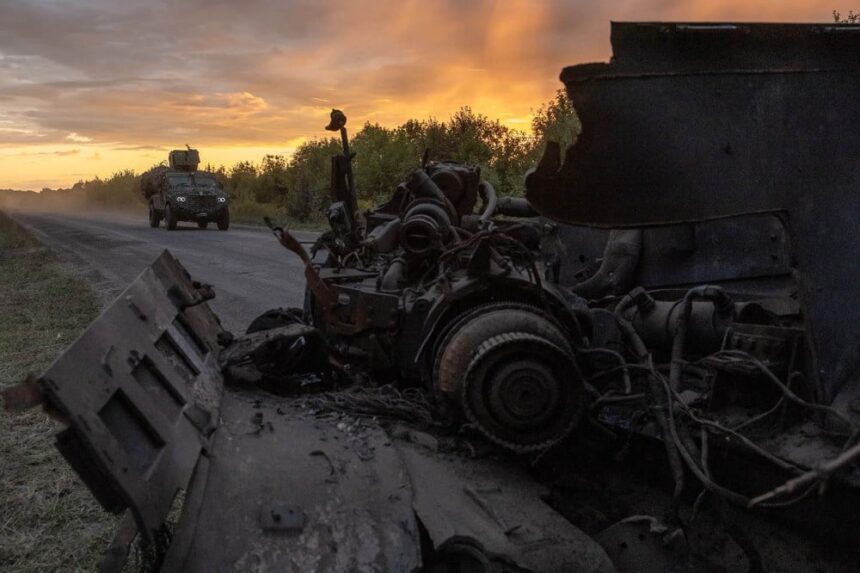- Ukrainian forces have made significant advances in Russia’s Kursk region, capturing over 74 settlements. This incursion has highlighted weaknesses in Russia’s border defenses and caused confusion in Moscow’s command structure.
- President Volodymyr Zelenskyy has stated that Ukrainian troops are continuing to push forward, capturing more than 100 Russian soldiers.
- Ukraine’s incursion into Russia’s Kursk region has exposed weaknesses in Russia’s border defenses and undermined President Putin’s claim of inevitable victory. The offensive has shifted the political landscape of the conflict, boosting morale in Ukraine and causing doubts in Russia.
- The Kursk operation, which has been more successful than Ukraine’s 2023 counteroffensive, has led to significant territorial gains. It may mark a turning point in the war, potentially prompting the West to intensify support for Ukraine to shorten the conflict.
Read more below.
Ukraine’s Kursk Offensive Is a Turning Point in the War
As Ukrainian forces expand their area of control in Russia’s Kursk region in the second week of their incursion, it’s clear that they will eventually have to go home. After all, the principle of territorial integrity is at the very core of Ukraine’s fight and the firm international reaction to Russia’s attempt to change Europe’s borders through conquest.
As Ukrainian forces expand their area of control in Russia’s Kursk region in the second week of their incursion, it’s clear that they will eventually have to go home. After all, the principle of territorial integrity is at the very core of Ukraine’s fight and the firm international reaction to Russia’s attempt to change Europe’s borders through conquest.
But that’s not the issue for today, and I will leave it to the experts to assess the military significance of the operation. It has clearly demonstrated significant weakness in Russia’s border defenses, set off confusion in Moscow’s chain of command, and proved Ukraine’s continued talent for surprising moves.
But wars are political as well as military, and it’s in the political arena where Ukraine’s incursion into Kursk has fundamentally changed the course of the conflict.
After the obvious failure of Ukraine’s much-hyped 2023 counteroffensive, Russian President Vladimir Putin worked hard to convince Ukraine and the world that it would only be a matter of time before the Russian steamroller inevitably ground Ukraine into submission, village by village. Putin calculated that if enough people bought into this narrative, Ukraine would be forced to eventually give up and be absorbed, either partially or entirely, into his greater Russia.
Putin’s strategy has had some success. The Russian military’s attempt at a major offensive in the Kharkiv region a few months ago soon fizzled out; Russian forces still don’t seem capable of that kind of effort against entrenched defenders. But over the course of the summer, Putin’s forces have been making incremental gains along the Donbas front line at the cost of tremendous losses in Russian lives and equipment. None of these gains have had any major military significance, but they were enough to give a dime of credibility to Putin’s narrative of gradually grinding down Ukrainian defenses.
And then, like a bolt out of the blue, comes the Kursk offensive, destroying what Putin has been trying to build. The Russian leader is clearly rattled. During a series of hastily convened meetings with his security council and other advisors, he’s been trying to play down Ukraine’s successes by calling them a “provocation,” admonishing regional governors not to mention the size of Ukraine’s area of control, looking sternly at his military commanders, and trying to appear unmoved by the sudden turn of events.
We know that Putin sometimes has a distorted view of reality. But he most certainly understands that if his forces don’t drive the Ukrainians back over the border soon, it will be a mortal blow to the narrative and political line he has carefully—and at great cost—been trying to build since last summer.
As Russian command still struggles to redeploy enough forces to Kursk to contain the invasion—let alone defeat it—it is clear that Ukraine’s quick Kursk operation has already seized far more ground than the unsuccessful 2023 counteroffensive. Ukrainian forces also seem to have been more successful over three days in Kursk than Russian forces were during three months in Kharkiv. It’s a turnaround in Ukraine’s fortunes every bit as dramatic as we have seen in the U.S. presidential race since the candidacy of Vice President Kamala Harris: Suddenly, everything looks different.
Ukraine may have captured around 1,000 square kilometers of Russian territory, Moscow has evacuated more than 100,000 people from the area, and large numbers of Russian soldiers seem to have surrendered without a fight. Still, the main result of the offensive isn’t on the battlefields in the Kursk region but in the political environments of Kyiv and Moscow.
Morale and determination have surged in the former, and doubts and uncertainties have increased in the latter. And Western capitals are waking up to a new reality in the war.
It’s been demonstrated that the war isn’t a long and painful road to an inevitable Ukrainian defeat—the Kremlin line that has been echoed by many in the West, including U.S. Republican vice presidential nominee J.D. Vance—but very much an open affair.
There is now every reason for the West to intensify its support of Ukraine. It’s not a question of the Ukrainian army advancing to the suburbs of Moscow—that will clearly not happen—but to force the Russian political leadership to understand that there is simply no way in which it can win this insane war. It’s already clear that the Kursk offensive has been a turning point in the war. Whether it will be the final turning point leading to this realization in the Kremlin is the critical question ahead. It could well be.
Of course, much depends on what happens on the battlefield in the coming days and weeks. Apart from trying to defeat the incursion, Putin’s inclination will almost certainly be to try to escalate against Ukraine—with more and larger missile attacks on Ukrainian cities, for example. That’s been the pattern in previous situations where he has faced setbacks.
But the critical question is whether he has the means for an effective response. He can hardly drop nuclear bombs on his own territory to dislodge Ukrainian forces. Russian missile and drone barrages against Ukrainian cities and infrastructure have so far had no effect on Ukraine’s determination to defend itself. And a further large-scale mobilization to generate more Russian soldiers—including so far largely exempted Moscow and St. Petersburg—might be more than his society and economy can take. North Korean and Iranian stocks of missiles and drones are not endless. Is he running out of options? Could he get more support from China? We can’t be certain, but his options are clearly narrowing.
In this situation, it is important to look at every way in which Ukraine’s backers can increase their support—with the clear and now more realistic aim of shortening the war. There is much that can be done. We can speed up financial support, lift restrictions on the use of certain Western weapons, accelerate the training of F-16 pilots, get smarter on sanctions (including against helpers in China, India, and Turkey), and speed up deliveries of ammunition from Western production, which is now gradually increasing.
War is certainly about what happens on the battlefield, but as the Prussian military strategist Carl von Clausewitz taught us, it is ultimately a battle of political will. There is little doubt that Putin still sees no alternative to winning his war, but after Ukraine’s Kursk operation, many others are beginning to lose conviction in his belief. Now it’s a question of accelerating that process—in order to shorten the war and lead to a more benign outcome.
By Carl Bildt, the co-chair of the European Council on Foreign Relations, and former prime minister and foreign minister of Sweden.
Source: Foreign Policy







